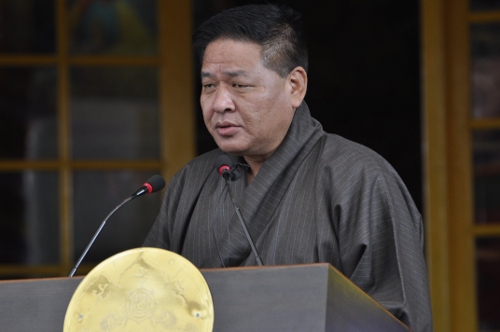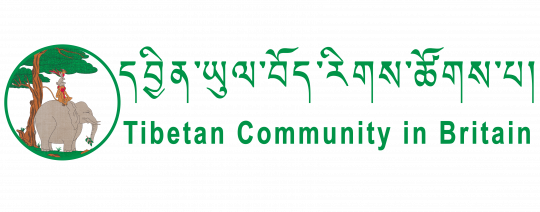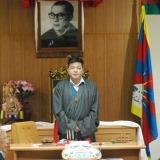Speech of the Tibetan Parliament in Exile on the occasion of the 25th anniversary of the conferment of the Nobel Peace Prize on His Holiness the Dalai Lama

Today is an outstanding day marking 25 years since His Holiness the Dalai Lama, the supreme protector of all Tibetans in Tibet and in exile, their guide, and a champion of world peace, having been awarded the globally acclaimed Nobel Peace Prize, graciously accepted it. Undaunted by the enormity of the difficulties of time and circumstances, His Holiness remains resolute in devoting his unimaginably exceptional deeds of body, speech and mind for the benefit of others – benefits which are freely availed by all sentient beings across the universe for their happiness and well being. On behalf of all Tibetans in Tibet and in Exile, and with feelings of happiness, devotion and joyousness, I take this opportunity to offer greetings to His Holiness with a sense of immense gratitude.
Twenty-five years ago on this day, in the year 1989, His Holiness the Dalai Lama was presented the Nobel Peace Prize. His Holiness was awarded this globally acclaimed peace prize because he relied solely on non-violent means based on the noble teachings of Buddhism and the profound thoughts of Mahatma Gandhi in his actions which were designed to benefit others in general and, especially, to revive or, as the case may be, preserve and promote the globally beneficial Tibetan people and their culture in the course of his efforts to seek a just end to the Tibetan issue. Likewise, by viewing things from the long term perspective of benefiting the attainment of mutual accommodation, friendship, fairness, and compassion across the world, His Holiness achieved appreciable results in his attempts to address international disputes and through his assumption of responsibilities to promote human rights and protect the environment. For these admirable efforts and accomplishments, which are an ongoing endeavour, His Holiness won the hearts and minds of the people of this world and the Nobel Peace Committee rightly awarded its acclaimed Peace Prize to him.
Even now, His Holiness continues to assume truly numerous responsibilities in his efforts to bring peace, freedom and happiness in this world. Undaunted by personal difficulties, he travels again and again to numerous countries of the East and West, offering profound, yet appropriate and definitely easily digestible messages about kindness and compassion, tolerance, altruism, non-violence and so on with a view to bring about peace, freedom and happiness in this world. In particular, His Holiness continues to make efforts to bring about interreligious harmony and solidarity on the basis of the followers of the different religions remaining true to their particular faiths. He also continues to promote through lectures and other means the concept of secular ethics and to build on his initiative of carrying out a dialogue between Buddhism and modern science as a part of his special interests. For his multitude of deeds and accomplishments which have earned him – and continue to earn him – enormous number of awards, including the Nobel Peace Prize, we can all be justly happy and proud.
This year, which mark 25 years since he was awarded the Nobel Peace Prize, the Nobel Peace Committee of Norway especially invited His Holiness the Dalai Lama to an unprecedented ceremony to commemorate the event and to pay compliments to him. This was a clear recognition once again of His Holiness the Dalai Lama for his continuing efforts to champion the cause of global peace.
Earlier this year, many awardees were scheduled to gather in South Africa to hold a major summit of Nobel Peace laureates. However, in an action resembling the bullying of a humble person who had no protection, the Government of South Africa refused to grant a visa for His Holiness the Dalai Lama. As a result, many Nobel Peace laureates took a firm stand in support of him and for the just cause that he embodied. As a result, the summit had to be suspended. On behalf of all Tibetans in Tibet and in exile, I offer these exceptional and noble persons who offered fruitful support for a just cause infinite gratitude.
In this year of 2014, the Nobel Peace Prize has been awarded jointly to the Indian child rights activist Mr. Kailash Satyarthi and the teenaged Pakistani girl Malala Yousafzai. They were chosen for the award because in this 21st century many children of the world are still not given educational and other opportunities while in some countries and regions girls are denied such opportunities. These two Nobel Peace laureates courageously struggled for these rights. I take this opportunity to compliment them and to offer congratulations. In this world of today marked by a period of mutual harm and violence caused by fighting and so on, we can but only offer the highest level of praise for the Nobel Peace Prize winners.
In 2010, Liu Xiaobo, a writer who had for the past more than 20 years championed the cause of human rights and democracy in his country, was awarded the Nobel Peace Prize. However, the government of China, being not happy with his advocacy of human rights, democracy, and so on, put him under arrest and he continues to remain imprisoned to this day. This shows nothing but the Chinese leaders’ determination to continue to strengthen its monopoly on political power by using all their powers. The action clearly shows that the Chinese leaders are paying only lip service to the protection of human rights, for in reality they are not at all concerned about the rights of the Chinese people. We strongly appeal to the Chinese leaders to immediately release people like him who advocate for human rights, democracy and related issues and who continue to suffer torture and persecution in prison. The Chinese leaders must consider enabling these people to enjoy the same rights that all human beings everywhere are entitled to. They also must ensure their all-round well being, if they are to truthfully abide by their commitments to uphold the United Nations’ Universal Declaration of Human Rights and other treaties that make up the international bill of human rights.
This is also the World Human Rights Day which is designed to commemorate the protection of human rights. I, on behalf of the Tibetan Parliament in Exile, would like to make an appeal to the governments of countries and territories, parliaments, organizations, well known political figures, scholars, and the general public who give great importance to the protection of human rights across this world. Since the invasion and occupation of Tibet, the government of China has carried out massive violations of human rights; countless number of totally innocent Tibetans have been detained and imprisoned and subjected to all manners of unrestrained and limitless persecution and torture, including with endless streams of killing. Such deplorable state of affairs continues today. I appeal to them to raise their protests to the government of China about this tragic situation. I also strongly appeal to them for result-oriented support in terms of pressuring the government of China to immediately end the persecutions and thereby lend their support to our just cause. At the same time, I also strongly call on the government of China to respect international law and conventions and thereby ensure a humanistic reorientation of its practices accordingly.
Taking the opportunity offered by the occasion today, I would also like to refer to some of the recent reports about human rights and other violations in Tibet by way of examples. At the end of September this year, a Chinese ethnic affairs meeting and the 6th meeting of the State Council for awarding outstanding contributors to the national ethnic unity was held in Beijing. At that meeting China’s leader Xi Jinping and other top leaders said that the fact that China was a multiethnic country was a characteristic feature of the nation, that this was an asset for the country’s progress, that the relationship between the people of China as a whole and that between the different ethnic groups was like that between a big family and the individual members of that family, and that the relationship between the different ethnic nationalities was like that among the different members of the same family. And they expressed opposition to the ideas of great Han chauvinism and narrow nationality-ism. They made a great show of being very emphatic in these assertions in their various speeches. In actual practice, however, the government of China has never entertained any of the suggestions designed to enable the entire Tibetan people to enjoy the kind of genuinely meaning autonomy that is in keeping with the basic features of the constitution of the People’s Republic of China. Rather, it has been firm in its practice of implementing what is nothing less than a policy of colonial subjugation. It bears no mentioning that under it the Tibetan people have been denied their political freedom. What is more, in the commercially profitable bigger cities and towns of Tibet, ethnic Tibetans have been reduced to a minority, and they have been marginalized and pushed to the fringe areas. And this is still an ongoing process. In addition, there are strong restrictions on the Tibetan people in the exercise of their human rights, in the practice of their religious belief, on their freedom of movement, and in their learning and use of their linguistic heritage. Tibet’s environment continues to be subjected to such enormous degrees of destruction that it would be very hard to restore them. In the face of these realities, the above remarks of the Chinese leaders are nothing but naked lies, asserting as true something which is false, and presenting as existing something which does not exist. They are nothing but empty talks designed to deceive and mislead both the international community and all the different ethnic nationalities of China. On the other hand, if the Chinese leaders claim to be sincere and factual in their above remarks, while rejecting our criticisms, we call on them to undertake concrete, on the spot implementation of their assertions so as to realize them thereby.
According to a report which recently appeared in the official Tibet Daily newspaper, a meeting of the Standing Committee of the Tibet Autonomous Region Committee of the Communist Party of China was convened on the 4th of November to announce a speech by President Xi Jining on the matter of the dispatch of a central inspection team to the region. During that meeting, a report called investigation of the corrective actions work on the recommendations given by a four-member central inspection team for Tibet was reported to have been presented. That report had said that the campaign to oppose separatism should be strengthened and cadres who harbour fantasies about the 14th Dalai Group, follow the Dalai Group, participate in supporting separatist infiltration sabotage activities, will be strictly and severely punished according to the law and party disciplinary measures. All this is despite the fact the government of China is fully in the know that His Holiness the Dalai Lama has been seeking – and continues to seek – to resolve the issue of Tibet only through the mutually beneficial middle way proposal. We therefore feel that the Chinese government is merely using the pretext of campaigning against separatism as an evil ploy to begin a campaign to ruin the careers of Tibetan cadres by using the device of legal measures.
Again, on the 7th of November this year, the website of China’s Tibet magazine carried a report about the holding of a function in Beijing for the inauguration of a project to make a realistic film about the Tibetan Buddhism’s system for the recognition of reincarnations of tulkus. The report spoke about the work for the supervision of the system in Tibetan Buddhism for the recognition of the reincarnations of tulkus having now been brought under legal restrictions. It also referred to the fact that in 2007, China’s State Administration of Religious Affairs had issued and announced a set of Regulation on Reincarnation of Living Buddha in Tibetan Buddhism. It added that these regulations lay down in clear terms the fundamental points underlying the system for the recognition of reincarnations of tulkus, the hierarchy of state authorities empowered to determine the fulfillment of conditions for the recognition and to grant permissions thereby. But the communist government of China is a professed atheist and knows absolutely nothing about religious matters. It is therefore patently obvious that by establishing legal regulations in a historically unprecedented action as a means to interfere in the Tibetan Buddhists’ system for the recognition of reincarnations of tulkus, China is simply making political misuse of this sacred religious practice. This is extremely uncalled for and there is no way anyone can accept it. We express absolute protest against it.
Across the length and breadth of Tibet, all centres of religious faith, including the monastic institutions, remain under as tight a set of restrictions as one can imagine. This also remains the case with Jhada Nunnery located in Kham Driru County. In particular, since September this year, work teams of particularly large numbers of Chinese cadres arrived there and forcibly ordered the nuns to carry out blasphemy against His Holiness the Dalai Lama. And because the nuns refused to comply, some 26 of them were expelled from the nunnery and thereby put under immense hardship. These facts clearly show that China still has not stopped imposing restrictions, control, and pressure on the Tibetan people’s religious rights and freedom.
Recently, it was reported by China’s official Xinhua news agency that the country had completed the building of the Zam Hydroelectric power station dam over the Yarlung Tsangpo river and that it had begun generating electricity. This project remains a source of great concern due to its potential for inflicting environmental damages in Tibet as well as for causing destructions in the downstream countries of India and Bangladesh. This has become a matter requiring urgent attention and we call on the concerned governments, scholars in the relevant fields and others to show a heightened level of concern over this development.
Since the 27th of September 1987, the general masses of Tibetans in Tibet have continued to carry out successive campaigns of peaceful protests. In particular, since the year 2009, a total of 132 Tibetans of all age groups have felt driven to carry out protest self-immolations, sacrificing their precious lives with an utterly selfless motive to hopefully accomplish something meritorious both for themselves and others. Everyone knows that the compelling mental pressure which drove all those Tibetans to make this ultimate sacrifice was the brutality beyond all limits with which the human rights of the Tibetan people were trampled on under the repression of China’s armed forces. I take this opportunity to reiterate by way of a further reminder that the leaders of the government of China take full responsibility for this very tragic development.
The unparalleled heroism and determination underlying the deeds and accomplishments of the utterly selfless patriotic men and women in Tibet, both living and dead, will be empathized with and extolled by all Tibetans across the globe. Besides, in order to accomplish the fundamental cause of the Tibetan people, namely the speedy resolution of their just cause, His Holiness the Dalai Lama, the incomparable leader of the Tibetan people, and the entire body of Tibetans living in exile will continue to carry out peaceful campaigns that are in addition to the numerous ones that are already being implemented.
Along with observing the glorious and victorious day of today, we pledge to keep in the centre of our hearts the peaceful and non-violent methods that his Holiness the Dalai Lama has shown us through his deeds. On this basis, we will remain motivated to carry out our duties to the best of our capabilities at each individual level so as to be of benefit towards achieving immediate as well as long term objectives both globally in general terms and for Tibet as a whole in particular. This is the essence of the objectives underlying our sense of gratitude towards His Holiness the Dalai Lama and the reason why we are observing this special occasion. I emphatically urge everyone to keep these in mind and carry them out in their day to day life.
Along with observing the day on which His Holiness the Dalai Lama was presented the Nobel Peace Prize, Himalayan Festival will be held for some days starting from this afternoon. People from the local Indian host community too will offer compliments to His Holiness the Dalai Lama for his deeds and accomplishments. As this symbolically represents the existence of an unassailable bond of friendship and fraternity between the Indian and Tibetan peoples, I offer my thanks to all the organizers of the festival. The gratitude we owe to the people of India and their central and state governments for all their help and friendship can never be forgotten. I again take this opportunity to reiterate our thanks and gratitude. I also appeal to everyone to continue to work together towards further strengthening the friendship between the two peoples.
Finally, I offer prayers that His Holiness the Dalai Lama and all our other great spiritual masters live a long, long life, that all their wishes be spontaneously fulfilled, that the happiness and well being of all the sentient beings in this world be ensured, and that the just cause of the Tibetan people see a speedy resolution.
The Tibetan Parliament in Exile
10th December 2014

